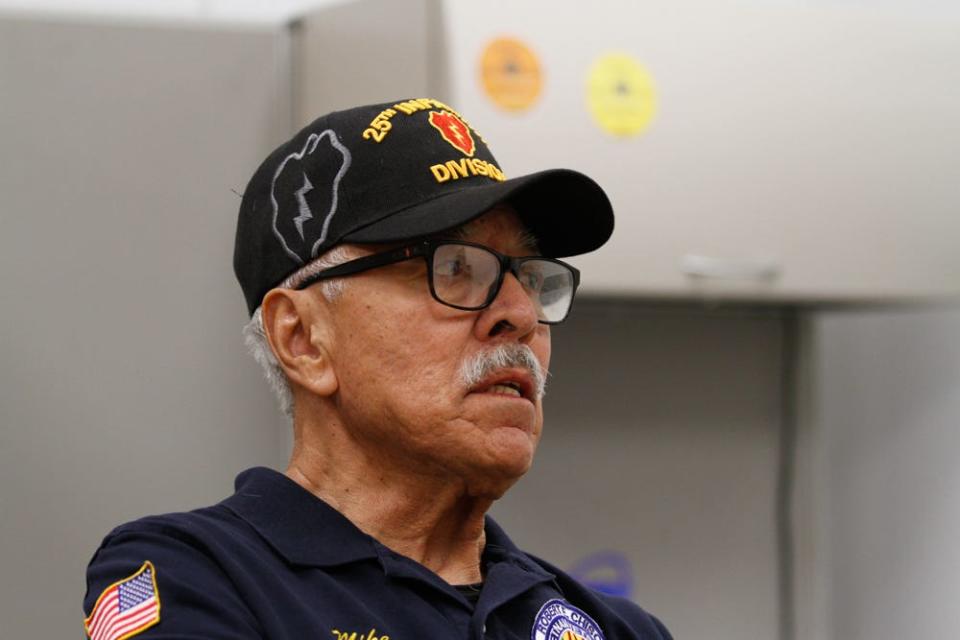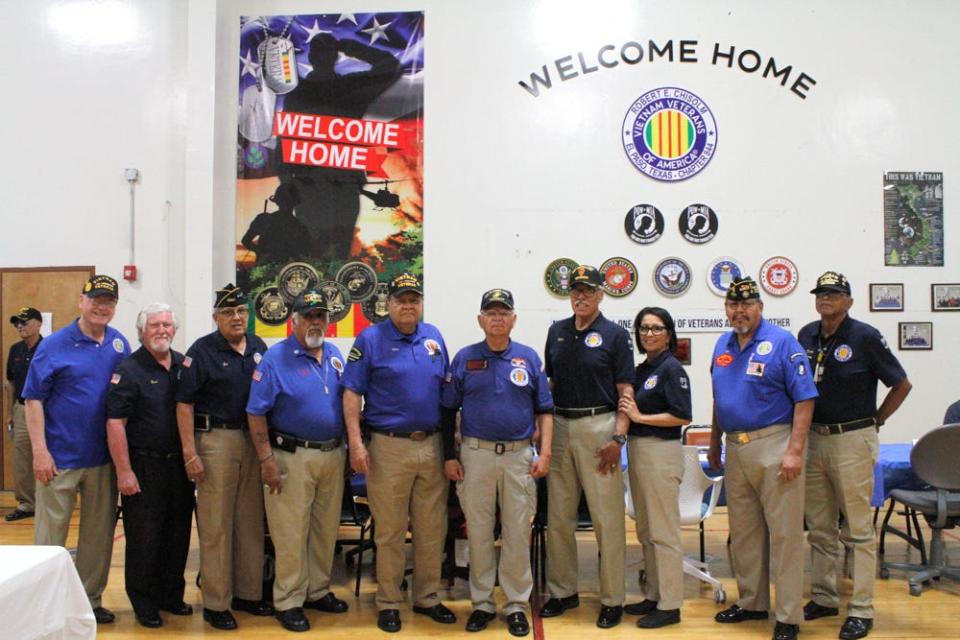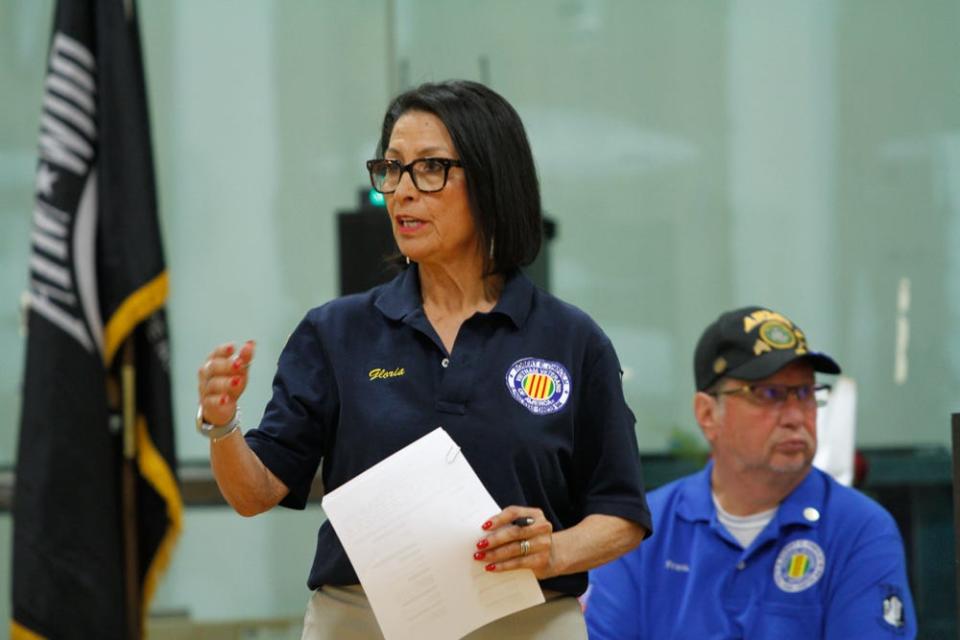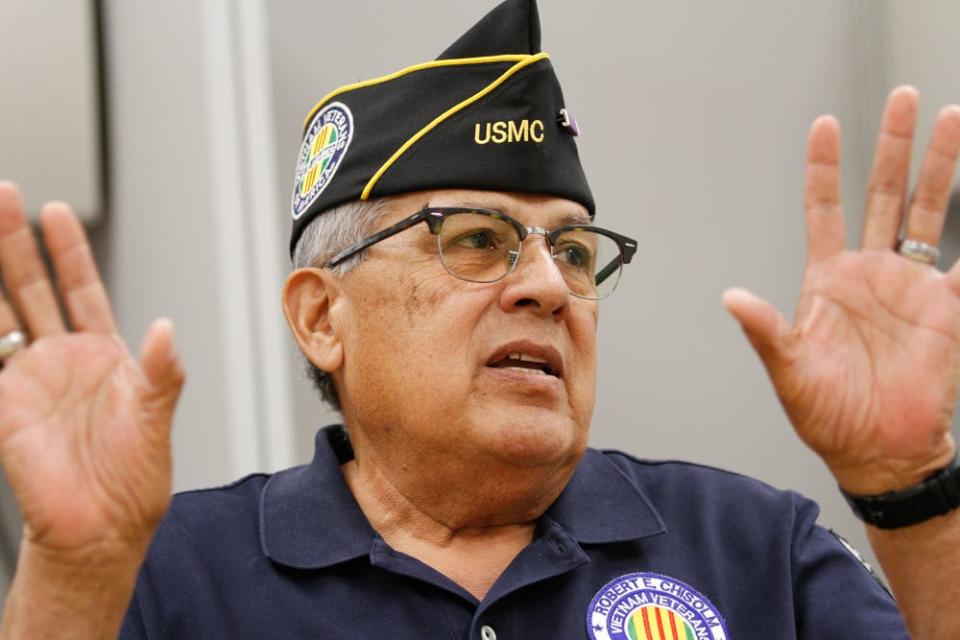Vietnam War veterans telling the realities of war to El Paso high school students
Just weeks out of high school in the 1960s, Mike Grijalva felt a sweltering heat in Vietnam that he never had experienced before: As soon as the military plane doors opened, he was in another country and instantly in heavy combat.
"I grew up in the barrio; that's all I knew," said Grijalva, who was 19 years old when he was sent to Vietnam, serving with the U.S. Army. "That was my whole world. I went to Burges (High School). I was an El Paso kid. I didn't know anything about the world, let alone Vietnam. When I was deployed, I discovered a whole other world. Just out of high school, I was already in a combat zone."

The untold stories of El Paso Vietnam veterans now are being heard, before it's too late.
The stories of hardship, combat and the unwelcome and ungrateful reception after the war are now being shared with high school students by the men and women who experienced it firsthand.
"My dad served in World War II and even with both of us being veterans, we never really talked about it," said Elias Camacho, who served in the U.S. Navy during the Vietnam War. "I wish I had. I don't have that opportunity anymore. He is gone and so are the stories of what he experienced. Us, Vietnam veterans, are getting up there in age and soon our stories will be gone.
"It is important these high school students hear these stories about the Vietnam War from those who were there, those who came back to a country that didn't want us. We were their age when we were sent to Vietnam. We were just kids like them."
The men and women of Vietnam Veterans of America El Paso Chapter 844 want to share their stories with students who are the same age they were when they deployed, telling about their experience of being young while fighting in the "most unpopular war" in U.S. history.
"I was still in high school when they sent me for my physical," Grijalva said. "After the physical, a captain there said 'You're One. You got 21 days. Sixteen days after that ‒ five days out of graduation ‒ I got my draft notice. My basic training was at Fort Bliss in September '66. In November '66, I got my advanced training in infantry at Fort Polk in Louisiana. I reported to Vietnam in February '67."
The group also talks to junior high students.
In Northeast El Paso, the names of 208 El Pasoans who made the ultimate sacrifice for their county are etched on the Vietnam Veterans Memorial at the El Paso Flags Across America site at 9570 Gateway Blvd. N.
Emotional impact on students
There are more than 100 members of the Vietnam Veterans of America El Paso Chapter 844, from all branches of the military, who meet monthly at Hospice of El Paso. The average age of the group is 76 years old, Camacho said.
Ten members go to speak to students at schools throughout El Paso County. A video of Vietnam veteran and prominent El Pasoan Jim Paul is played during the speaking engagement.

"There were more than 58,000 Americans killed in the war, with more than 33,000 of them being just 18 years old," said Paul, whose served in the U.S. Army. "The students we are talking to are that age or around the age we were then. Most of the people drafted and sent to war were their age. When they hear that, it really brings it home of what the Vietnam War was and who made the ultimate sacrifice for their country in the most unpopular war in U.S. history."
The veterans who speak to the students are Camacho; Grijalva; Joe Ortiz Jr., U.S. Marine Corps; Gloria Sapien Peña, U.S. Army Nurse Corps; Steve Nordberg, U.S. Air Force; Douglas P. Davis Sr., U.S. Army; Frank Rios, U.S. Marine Corps; Alfred Saenz, U.S. Marine Corps; Samuel Gonzalez, U.S. Navy; and Raul Vargas, U.S. Marines.
A connection between the veterans and students is quickly built as the veterans are open and honest with the students.
"When they first asked me to do it, I was kind of leery because I didn't think these kids really cared about it," Ortiz said. "But when I went and I started giving the classes, I was surprised that they're really receptive to it. They really are. Mike (Grijalva) and I were both in heavy combat and some of these kids would come up and actually hug us and start crying. It was like, 'Wow, they do care.' It's amazing that they do care."

For the first time, the students are seeing the human side of the war and the impact it had on the veterans during the battle and after they returned to the States, Camacho said.
"I've had some of the students come up after with tears in their eyes," Camacho said. "They didn't know a lot about this stuff. This is something that is not talked about in school. Maybe in classes, they talk about the Vietnam War in the perspective of how it started and the politics of it. But there was a human part to it. And this is what they don't know about."
Stories of combat
The stories include the experience of landing in Vietnam, being in heavy combat, the loss of friends and the resentment they encountered when they returned home.
What was that experience like?
"Scary," said Ortiz, who was awarded a Purple Heart after being struck by shrapnel. "It was scary. You're 19. You're in a foreign country. You're just out of high school, so you really didn't know what to expect. You had gone through training, but what the training was like and what you experienced were totally different. But I am alive and I am thankful."
There is only one question the veterans will not answer: How many people did you kill?
"That is something we don't talk about," Grijalva said. "Some of us saw heavy combat, while others didn't. And that's that. We just tell them our story, our experience and that's it."
Ortiz added: "We don't answer that. You don't want to hear stuff like that. I totally shut it out for many years."
No welcome home parade
Those lucky enough to make it home were not welcomed back, the veterans said.
"They would call us 'baby killers,' they would spit at us," Paul said. "It wasn't like World War II, where there were parades in the street. A lot of people hated us. That's just how it was ‒ no parades, no welcome backs, nothing."
As they fought thousands of miles from home, riots and political discord over the war were happening in the U.S. The veterans would hear about the protests, but they didn't know how wide the divide was until they arrived home.
"The American people here started calling us 'baby killers' and that we lost the war," Ortiz said. "We didn't lose the war. It wasn't our fault. Our hands were tied as the people in Washington were fighting with each other as we were 10,000 miles away. We didn't have Washington's backing. It was a crazy time, a crazy war. I still have bitter feelings."

The problems didn't stop there for many veterans. The stigma of fighting in Vietnam stayed with many veterans, causing them to struggle to find jobs or making it difficult to talk with someone about the hardships they suffered.
"It messed you up," Ortiz said. "A lot of veterans came back and suffered from addiction. It was hard to adjust back to a normal life. I was lucky to have a strong wife who helped me through it."
Ortiz said he tried to get a job at a Safeway grocery store when he came back. He was one of several applicants, but the only one with short hair. The others had long hair. Just from that, the manager figured out Ortiz had served in Vietnam.
"He took me in his office and he said, 'I'd love to hire you, but I've been looking at your paperwork. You were in Vietnam, weren't you?' I said, 'Yeah.' He said, 'Well, I can't hire you.' I asked why not. He said, 'Because Safeway has a policy right now that we're not hiring Vietnam veterans because you're all crazy.'"
The trauma of serving in Vietnam stayed with the veterans long after their tours of duty ended.
"It's changed now," Ortiz said. "But back then it was hard. People just didn't understand what we went through and how we were trying to get back to living a normal life."
The stories help students understand the impact the war had on the veterans while they were in Vietnam, as well as the effects it had on them when they returned.
"It is important that this generation knows these stories," Camacho said. "This is what life was like for us. We were kids drafted to serve our country. We had no choice. Yet, we were called 'baby killers.' I think telling these stories has helped people realize you don't treat your soldiers coming home like that."
Stories still waiting to be heard
While the veterans have told their stories to dozens of classes throughout El Paso County, they are working to meet with as many students as possible.
For more information on how to schedule a group visit to your class or community group, call Camacho at 915-307-4839 or 915-843-6889.
Aaron Martinez may be reached at amartinez1@elpasotimes.com or on Twitter @AMartinezEPT.
This article originally appeared on El Paso Times: Vietnam veterans tell realities of war to El Paso high school students

